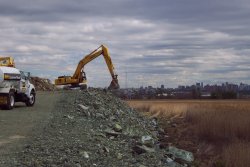
Serpentine rock carted from Stevens Institute in Hoboken at the foot of Washington Avenue in Carlstadt, New Jersey.
New Jersey Meadowlands Commission issues cease and desist order to Carlstadt property owner Empire, Lmt.
(April 2002)
On April 24, the New Jersey Meadowlands Commission ordered Empire, Lmt. to stop dumping and remove asbestos-containing rock at their property in Carlstadt, New Jersey. Nearly every weekday since March 11, a caravan of trucks has carted out countless tons of serpentine rock to make way for an 800-car parking garage to be built by Stevens Institute of Technology near Castle Point in Hoboken. This has resulted in a long green mound of this hazardous material amidst the tall fragmites grass in the Meadowlands at the foot of Washington Avenue east of Veterans Boulevard. On July 24, 2000, the New Jersey Meadowlands Commission issued a permit to Empire Lmt. to place clean fill at this site. No notice was provided by the property owner to the Commission that they would be unloading a known carcinogen at this site.
Brothers Richard and Anthony Dinallo are partners in Empire Lmt. and also principals in Terminal Construction Company. For the past seven weeks, Terminal Construction Company, the general contractor for Stevens Institute of Technology has drilled, blasted and excavated the serpentine rock that comprises part of Castle Point at Hoboken’s waterfront at 6th and River Streets. Although, Stevens has monitored the air for asbestos from the beginning, they provided no notice to the City, State or the public of this potential health hazard. Stevens officials have claimed that they are under no obligation to do so. The presence of asbestos became known on April 10, 2002 when the Fund for a Better Waterfront filed a complaint with the Hoboken Board of Health. On April 12, 2002, the contractors began for the first time hydrating the site to control the dust being created by this operation.
Chrysotile, also known as “white asbestos,” is one of several minerals that is found in serpentine rock. Asbestos is a hazard when it becomes airborne and is inhaled in the lungs. The major health risks linked to asbestos are asbestosis, a scarring of the lungs; mesothelioma, a cancer of the lung and chest linings; and lung cancer. The EPA has no official threshold for the acceptable level of asbestos in the air. They are currently applying a standard of 70 structures of asbestos per square millimeter in the filters sampling 1200 liters of air at the World Trade Center site. Four samples taken so far at the Hoboken site by the consultant to Stevens Institute of Technology have exceeded that limit. Between March 11 and April 10, nearly every air sample gathered at the Castle Point site detected the presence of chrysotile.
The extensive excavation now being undertaken by Stevens Institute of Technology is for an exposed, 800-car parking garage that will face Hoboken’s waterfront. No planning or zoning board approvals have been granted for this garage. Nevertheless, the Hoboken building inspector, Alfred Arezzo, issued a construction permit on November 20, 2001 that states, “install/construct foundation and parking garage.” Hoboken’s local ordinance also requires the Health Officer provide written permission prior to the issuance of a building permit for construction. No such permission was granted by the Hoboken Health Department.
FOR MORE INFORMATION CALL 201-217-0500.
FBW News Archive

